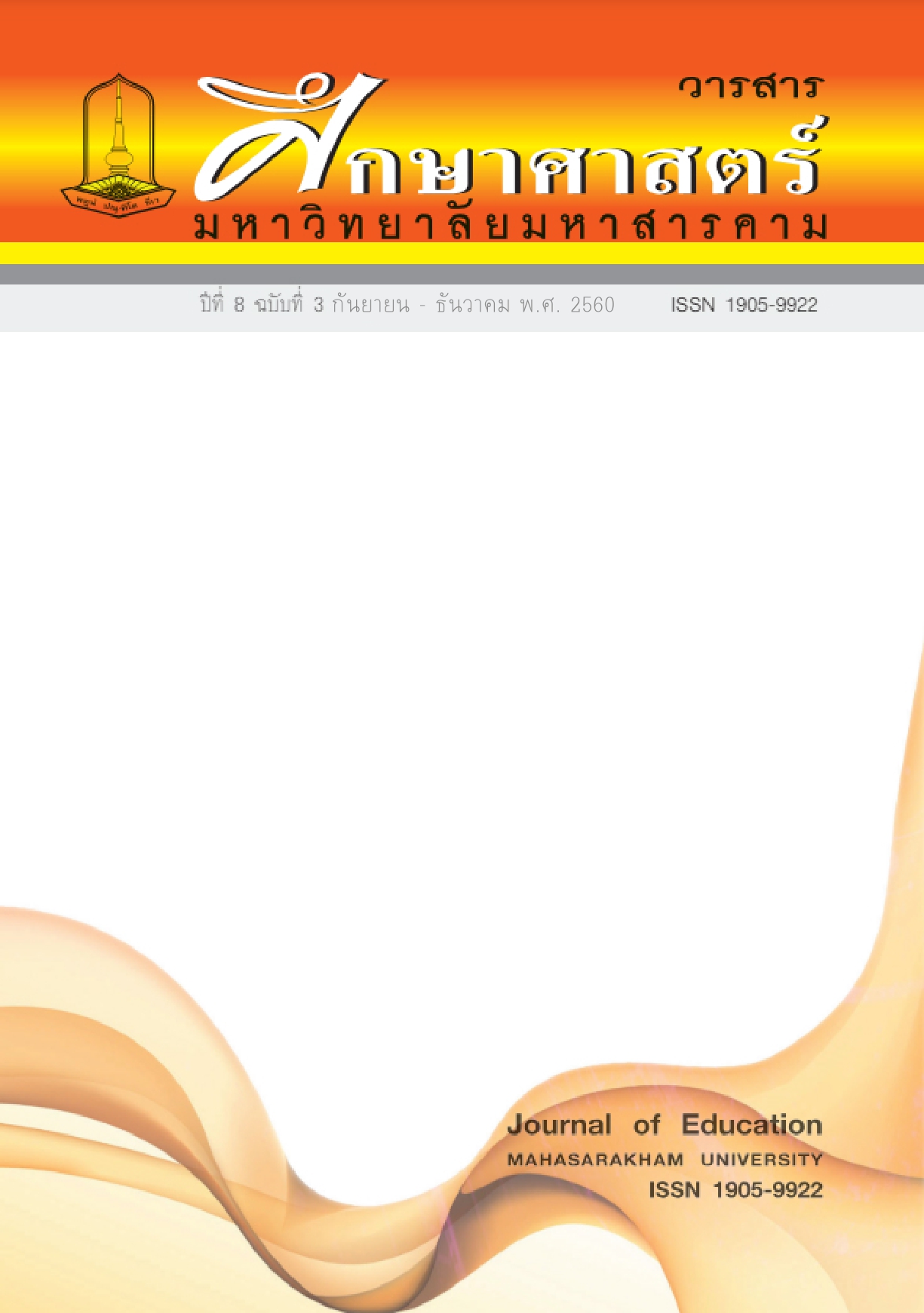Developments of Teachers’ Development Program Toward Research for Developing Learning for Schools Under the Secondary Educational Service Area Office 27
Main Article Content
Abstract
The purposes of this research were to: (1) studied elements and indicators of teachers’ development toward research for developing learning for schools under the Office of Secondary Educational Service Area Office 27 (2)studied current and desirable circumstances of teachers’ development toward research for developing learning for schools under the Secondary Educational Service Area Office 27 (3) studied teachers development methods toward research for developing learning for schools under the Secondary Educational Service Area Office 27 (4) develop teachers development program toward research for developing learning for schools under the Secondary Educational Service Area Office 27 The research divided into 4 phases: (1) the studied of elements and indicators for developing learning from appropriateness of elements and indicators evaluation form (2) the studied of current and desirable circumstances of teachers’ development toward research for developing learning. The subjects were 338 teachers from the questionnaire of check list and rating scale 5 (3) the studied of teachers’ development methods toward research for developing learning for schools under the Office of Secondary Educational Service Area Office 27 from theoretical concepts and researches related to teachers’ development methods for developing learning. Then synthesized and summarized to the teachers’ development toward research for developing learning (4) the development of teachers’ development program toward research for developing learning for schools under the Secondary Educational Service Area Office 27 from appropriateness and possibility of evaluation form of teachers’ development program toward research for developing learning by classification the questions to rating scale 5. The statistics used were means and standard deviation. The results of the studied were as follows:
1. The elements and indicators of teachers’ development toward research for developing learning consisted of 5 elements and 22 indicators as following: first element was problems and learning development needs analysis consisting of 2 indicators, second element was problem solving plans or writing research projects for learning development consisting of 8 indicators, third element was setting problem solving and learning development activities consisting of 4 indicators, fourth element was data collection and data analysis consisting of 4 indicators, fifth element was the conclusion of problem solving results and learning development consisting of 3 indicators.
2. The current circumstances of teachers’ development toward research for developing learning as a whole indicated at an average level. When ordering from high to least level found that data collection and data analysis, problem solving plans or writing research projects for learning development, conclusion of problem solving results and learning development, setting problem solving and learning development activities, and problems and learning development needs analysis respectively. The desirable circumstance of teachers’ development toward research for developing learning for schools under the Secondary Educational Service Area Office 27 as a whole indicated at a good level. When ordering from high to least level found that the conclusion of problem solving results and learning development, problems and learning development needs analysis, setting problem solving and learning development activities, problem solving plans or writing research projects for learning development, the conclusion of problem solving results and learning development, and data collection and data analysis respectively.
3. Teachers’ development methods toward research for developing learning consisted of 5 methods as following 1) Self-study 2) Training 3) Coaching and Mentoring 4) Learning from doing and 5) Knowledge sharing.
4. The teachers’ development program toward research for developing learning for schools under the Secondary Educational Service Area Office 27:
4.1 The teachers’ development program toward research for developing learning for schools under the Secondary Educational Service Area Office 27 consisted of 1) Introduction 2) Rationale 3) Purposes 4) Trainees 5) Duration 6) Content and Framework 7) Development Methods 8) Materials and 9) Measurement and Evaluation. The scope of contents consisted of 5 modules including module 1) problems and learning development needs analysis, module 2) problem solving plans or writing research projects for learning development, module 3) setting problem solving and learning development activities, module 4) data collection and data analysis and module 5) the conclusion of problem solving results and learning development.
4.2 The evaluation of teachers’ development program toward research for developing learning for schools under the Secondary Educational Service Area Office 27 as a whole indicated at a good level and the possibility was found at a good level.
Downloads
Article Details
References
กรมวิชาการ. (2545). การวิจัยเพื่อพัฒนาการเรียนรู้ตามหลักสูตรการศึกษาขั้นพื้นฐาน. กรุงเทพฯ: โรงพิมพ์คุรุสภาลาดพร้าว.
กรมวิชาการ. (2544). การวิจัยในชั้นเรียน. กรุงเทพฯ: โรงพิมพ์รับส่งสินค้าและพัสดุภัณฑ์.
กรมวิชาการ. (2543). แนวทางการบริหารโรงเรียนปฏิรูปการเรียนรู้. กรุงเทพฯ: โรงพิมพ์คุรุสภาลาดพร้าว.
กระทรวงศึกษาธิการ. (2545). พระราชบัญญัติการศึกษาแห่งชาติ พ.ศ. 2542 และที่แก้ไขเพิ่มเติม (ฉบับที่ 3) พ.ศ. 2554. กรุงเทพฯ: โรงพิมพ์องค์การรับส่งสินค้าและพัสดุภัณฑ์ (ร.ส.พ.).
ชาตรี เกิดธรรม. (2545). อยากทำวิจัยในชั้นเรียนแต่เขียนไม่เป็น. กรุงเทพฯ: ดิจิตอล เลิร์นนิ่ง.
ธำรง บัวศรี. (2542). ทฤษฎีหลักสูตร: การออกแบบและพัฒนา. พิมพ์ครั้งที่ 2. กรุงเทพฯ: พัฒนศึกษา.
บุญชม ศรีสะอาด. (2554). การวิจัยเบื้องต้น. (พิมพ์ครั้งที่ 9). กรุงเทพฯ: สุวีริยาสาส์น.
ไพศาล วรคำ. (2554). การวิจัยทางการศึกษา. มหาสารคาม: คณะครุศาสตร์ มหาวิทยาลัยราชภัฎมหาสารคาม.
มนพ สกลศิลป์ศิริ. (2553). การพัฒนาคุณภาพครูในสถานศึกษาขั้นพื้นฐาน: การวิจัยเชิงปฏิบัติการแบบมีส่วนร่วม. วิทยานิพนธ์ ค.ด. ขอนแก่น: มหาวิทยาลัยขอนแก่น.
วิราพร พงศ์อาจารย์. (2547). การวิจัยและพัฒนาชุดฝึกอบรมเพื่อการพัฒนาและฝึกอบรมครู เรื่องการวิจัยเพื่อพัฒนาการเรียนรู้. รายงานการวิจัย มหาวิทยาลัยราชภัฏพิบูลสงคราม.
สถาบันทดสอบทางการศึกษาแห่งชาติ (องค์การมหาชน). (2558). รายงานผลการทดสอบทางการศึกษาระดับชาติขั้นพื้นฐาน (O-NET). กรุงเทพ: สถาบันทดสอบทางการศึกษาแห่งชาติ.
สนิท สัตโยภาส. (2556). การวิจัยเพื่อพัฒนาการเรียนรู้ สู่การพัฒนาผลงานทางวิชาการของครูมืออาชีพ. กรุงเทพ: สถาบันส่งเสริมและพัฒนาการอ่านการเขียนแห่งประเทศไทย.
สุทิน วงศ์ประพันธ์. (2551). ปัจจัยที่ส่งผลต่อการวิจัยเพื่อพัฒนาการเรียนรู้ของครูผู้สอนในสถานศึกษาขั้นพื้นฐาน สังกัดสำนักงานเขตพื้นที่การศึกษามหาสารคาม เขต 1. วิทยานิพนธ์ ครุศาสตรมหาบัณฑิต มหาวิทยาลัยราชภัฎมหาสารคาม.
เสาวภาคย์ รศพล. (2552). ปัญหาและแนวทางพัฒนาการวิจัยเพื่อพัฒนาการเรียนรู้ของครู ในโรงเรียนสังกัดเทศบาลจังหวัดพิษณุโลก. วิทยานิพนธ์ ค.ม.พิษณุโลก: มหาวิทยาลัยราชภัฏพิบูลสงคราม.
Barr, MJ. and Keating, L.A. (1990). “Introduction: Element of program development,” in M.J. and Keating and Associates. Developing effective student services program. San Francisco: Jossey-Bass.
Niedermeyer, L.C. (1992). A Checklist for reviewing environmental education programs. The Journal of environmental education.
Rothwell, W.J. & Cookson, P.S. (1997). Beyond instruction: Comprehensive program planning for business and education. San Francisco, CA: Jossey-Bass Publishers.


